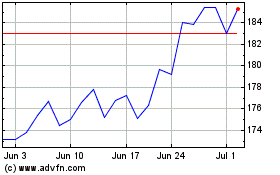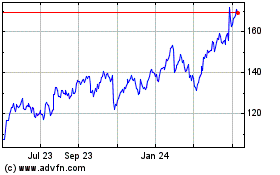Supreme Court to Hear Google Appeal of Oracle Win in Copyright Case--2nd Update
November 15 2019 - 7:25PM
Dow Jones News
By Brent Kendall and Jess Bravin
WASHINGTON -- The Supreme Court agreed to hear an appeal by
Alphabet Inc.'s Google, challenging its loss to Oracle Corp. in a
copyright case that could produce a multibillion-dollar verdict and
have wide ramifications for the software industry.
The court on Friday announced its review in a brief written
order. The case dates back to 2010, when Oracle alleged Google's
Android smartphone-operating system infringed on copyrights related
to Oracle's Java platform -- technology Oracle acquired when it
bought Sun Microsystems Inc. that year.
An appeals court last year rejected Google's defenses and set
new legal proceedings for how much it owes Oracle in damages.
Oracle previously has sought as much as $9 billion.
The litigation focuses on a key issue in the tech industry: How
software developers use application-program interfaces, or APIs,
prewritten packages of computer code that allow programs, websites
or apps to talk one another.
Oracle alleged Google illegally copied more than 11,000 lines of
Java API code to develop its Android operating system, which runs
more than 2 billion mobile devices world-wide. It also accused
Google of seeking to weaken important legal protections for
software.
"Oracle spent years and hundreds of millions of dollars writing
a blockbuster work -- a software platform," the company said in a
court brief. "Google then refused Oracle's offer of a license and
copied the most recognizable portions of that work into a competing
platform."
On Friday, Oracle said it is "confident the Supreme Court will
preserve long established copyright protections for original
software and reject Google's continuing efforts to avoid
responsibility for copying Oracle's innovations."
Google argued Oracle shouldn't be able to assert copyrights on
basic software commands. An Oracle win "will upend the longstanding
expectation of software developers that they are free to use
existing software interfaces to build new computer programs,"
Google said in its petition seeking Supreme Court review.
"We hope that the court reaffirms the importance of software
interoperability in American competitiveness," said Kent Walker,
Google senior vice president for global affairs.
The case went to trial twice. In the last round, jurors accepted
Google's arguments that its copying of the Java code was fair use,
but the U.S. Court of Appeals for the Federal Circuit overturned
that conclusion last year.
"There is nothing fair about taking a copyrighted work verbatim
and using it for the same purpose and function as the original in a
competing platform," the appeals court said.
The Supreme Court took the case against the advice of the
Justice Department, which argued there was no need for the justices
to intervene. U.S. Solicitor General Noel Francisco said in a court
brief that Oracle's code was eligible for copyright protection. Mr.
Francisco said the lower court's ruling on fair use wasn't "free
from doubt," but argued this particular case wasn't the best
opportunity for the high court to flesh out that area of the
law.
An array of tech companies and trade associations urged the high
court to hear the case, including Microsoft Corp., which said the
lower court's limited view on the fair use of computer code
threatened innovation in software production, which "is often a
highly collaborative process in which many different players
participate."
The justices also said Friday they would consider whether
military personnel could be charged with rapes allegedly committed
before 2006, when Congress amended the Uniform Code of Military
Justice to clarify that a five-year statute of limitations didn't
apply.
Earlier this year, the U.S. Court of Appeals for the Armed
Forces overturned several courts-martial of Air Force supervisors
who were charged more than five years after allegedly raping women
trainees. The issue arose because of a complicated interplay
between civilian and military law that the appeals court found
created a gap in congressional authorization for rape charges to be
filed without regard to when the crime took place.
In February, the military appeals court held that the default
statute of limitations, five years, applied to several convictions
before it. On appeal to the Supreme Court, the government
disagreed.
Moreover, the government said, there were particular reasons the
time bar was inappropriate for the military, including that the
hierarchical nature of the armed forces exacerbates the
underreporting of rape, which often is perpetrated by a superior
against a subordinate.
One of the cases accepted Friday is over a decade old. Lt. Col.
Michael J.D. Briggs was tried by a military judge in 2014 for the
May 2005 rape of a female airman, identified as DK, from his
squadron's aircrew in Idaho. Seven years later, and before
reporting the crime, DK phoned Lt. Col. Briggs and secretly
recorded him saying "I will always be sorry for raping you,"
according to the appellate opinion. He was subsequently sentenced
to five months in jail with dismissal and a reprimand.
The Supreme Court is expected to hear the cases early next year,
with decisions expected by the end of June.
Write to Brent Kendall at brent.kendall@wsj.com and Jess Bravin
at jess.bravin@wsj.com
(END) Dow Jones Newswires
November 15, 2019 19:10 ET (00:10 GMT)
Copyright (c) 2019 Dow Jones & Company, Inc.
Alphabet (NASDAQ:GOOGL)
Historical Stock Chart
From Mar 2024 to Apr 2024

Alphabet (NASDAQ:GOOGL)
Historical Stock Chart
From Apr 2023 to Apr 2024
